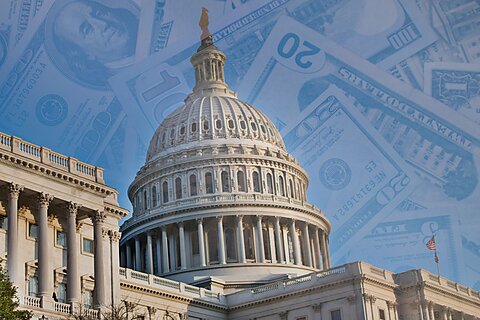Romina Boccia and Dominik Lett
President Donald Trump has released his “skinny” budget blueprint for fiscal year (FY) 2026, three months past the statutory February deadline. The proposal calls for a significant change in discretionary spending priorities, surging funding for defense and border security while slashing spending on other nondefense programs. The administration deserves credit for its refusal to abuse phony emergency spending and calls to downsize nondefense programs, including the elimination of several unneeded agencies.
In many respects, the budget enshrines the priorities of the Department of Government Efficiency (DOGE), such as agency consolidation, workforce reductions, and federal divestment from state and local functions. Congress should embrace the spending reductions in the budget and act on them.
Note that this is a partial “skinny” budget, so it makes no real attempt to restrain the primary drivers of the deficit—Social Security, Medicare, and Medicaid. Without changes to these old-age retirement and health care programs, the US will remain hurtling towards a fiscal crisis. The administration has indicated it will release its full budget containing entitlement changes at a later date.
Disappointing Topline
At first glance, the topline numbers are striking. The administration proposes holding defense spending flat while shrinking nondefense spending by 23 percent relative to base FY2025 levels. That would mark a significant reduction compared to the prior year (-$163 billion) and would be a notable improvement over the current discretionary spending trajectory. Unfortunately, Republicans plan on boosting defense and border security funding using reconciliation, a process distinct from appropriations. After accounting for those plus-ups, the requested topline base discretionary funding level will be equal to FY2025’s base enacted level of $1.6 trillion. If you include so-called non-base funding (generally emergency or other special budget categories designed to evade spending caps), the FY2026 discretionary total stands at nearly $1.7 trillion, a 7.6 percent reduction compared to FY2025 total discretionary levels.
In any case, the president’s discretionary budget topline should not be a cause for celebration.
Debt as a share of the economy is slated to surpass WWII-era record-high levels by FY2029 and continue to grow thereafter. Such high levels of debt slow economic growth, boost inflation, and raise interest costs, undermining the standard of living for all Americans. Given the severity of the fiscal outlook, the US should be returning to pre-pandemic levels of discretionary spending, not maintaining Biden-era levels of spending.
Here are reactions to the president’s budget from fellow Cato scholars.
Reviving Federalism
Cato’s Chris Edwards said,
One theme of the administration’s budget proposal is to revive federalism by cutting grants to the states for education, housing, energy subsidies, water projects, and other properly local activities. Grants to the states are perhaps the most wasteful federal spending of all, so such cuts would both save money and promote improved governance. The states have their own powerful fiscal engines and are entirely capable of funding their own local priorities.
Eliminating Unneeded Cultural Subsidies
Cato’s Ryan Bourne explained,
President Trump’s proposal to eliminate the National Endowment for the Arts and the National Endowment for the Humanities is welcome and should be made reality. There is no clear constitutional or economic case for federal arts and humanities subsidies. Great art and scholarship can thrive through market and philanthropic support. If we want cultural freedom and artistic excellence, without politicization, the best thing Washington can do is get out of the way.
Cutting Waste at HHS
Cato’s Michael Cannon noted,
The Trump administration proposes to cut spending at the Department of Health and Human Services by $33 billion. While this proposal is a step in the right direction, it is merely a 26 percent cut to 9 percent of HHS’s $1.8 trillion in annual spending. There is plenty of room to cut HHS outlays dramatically and still have enough money left for legitimate public health activities, employees who cost-effectively block improper spending, and employees who remove market-entry barriers.
Defunding the OECD
Cato’s Adam Michel explained,
The discretionary budget request includes a $1.7 billion reduction in assessed and voluntary contributions to international organizations, including the United Nations. Cutting UN funding is a great start. The request stays silent on US funding for the Organisation for Economic Co-operation and Development (OECD), which has led the European proposal for an international tax cartel to raise taxes on America’s most successful businesses. The budget request should more explicitly spell out the proposed cuts to US support for the OECD Part 1 core budget and Part 2 voluntary contributions. This additional specificity would be consistent with the president’s Executive Order terminating US involvement in the Global Tax Deal and letters from House and Senate members requesting the appropriations committees to prohibit US funding of the OECD.
Capping Spending and Closing Loopholes
In addition to acting on the president’s spending cut proposals, Congress should adopt binding 10-year discretionary spending caps with a 2 percent annual spending growth limit. Imposing transparent resource constraints should motivate legislators to prioritize core government functions and more carefully examine the trade-offs inherent in all spending decisions. Likewise, Congress should also implement offsets for any new emergency designations, deterring phony and wasteful emergency spending.
Now the ball is in Congress’s court. Hopefully, legislators will take the bold action needed to curb runaway spending and right-size federal government, but don’t hold your breath.
Note: This will be a running blog that we will update with additional information going forward.
















